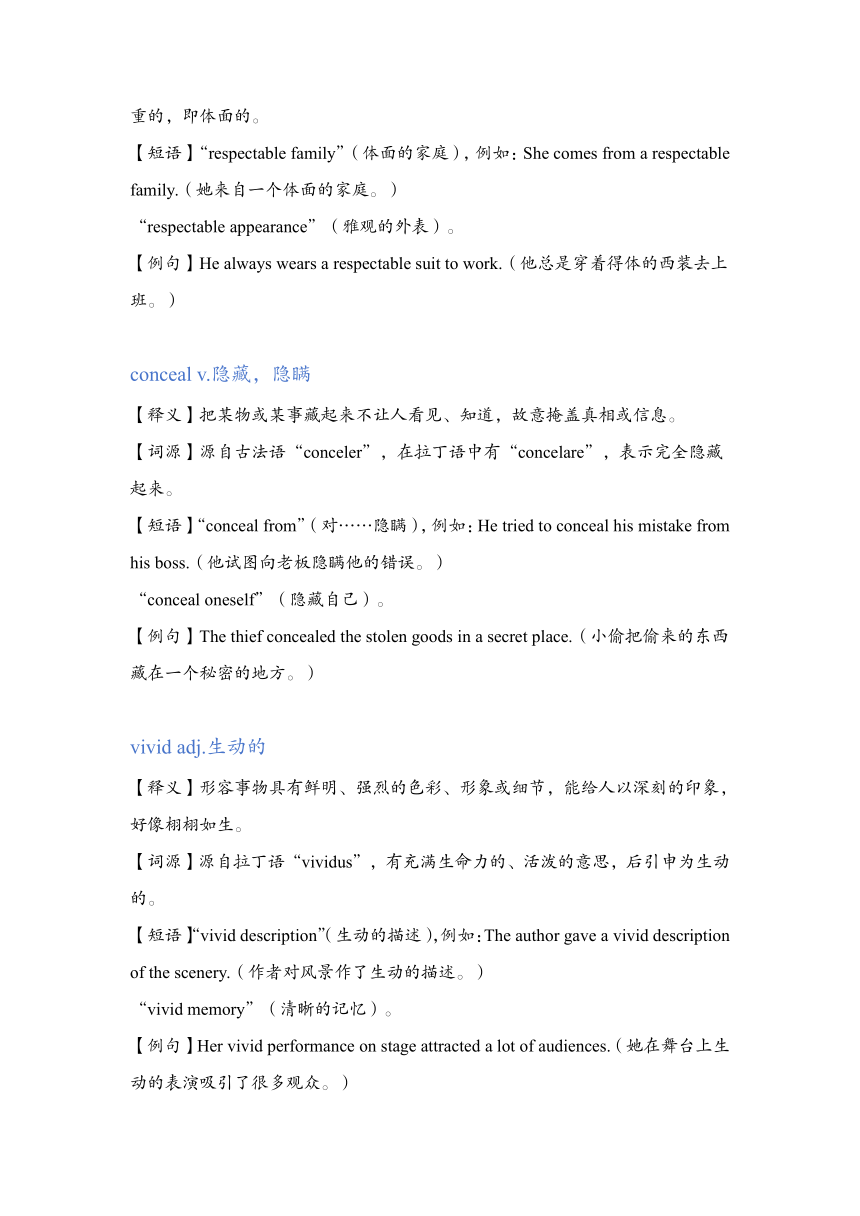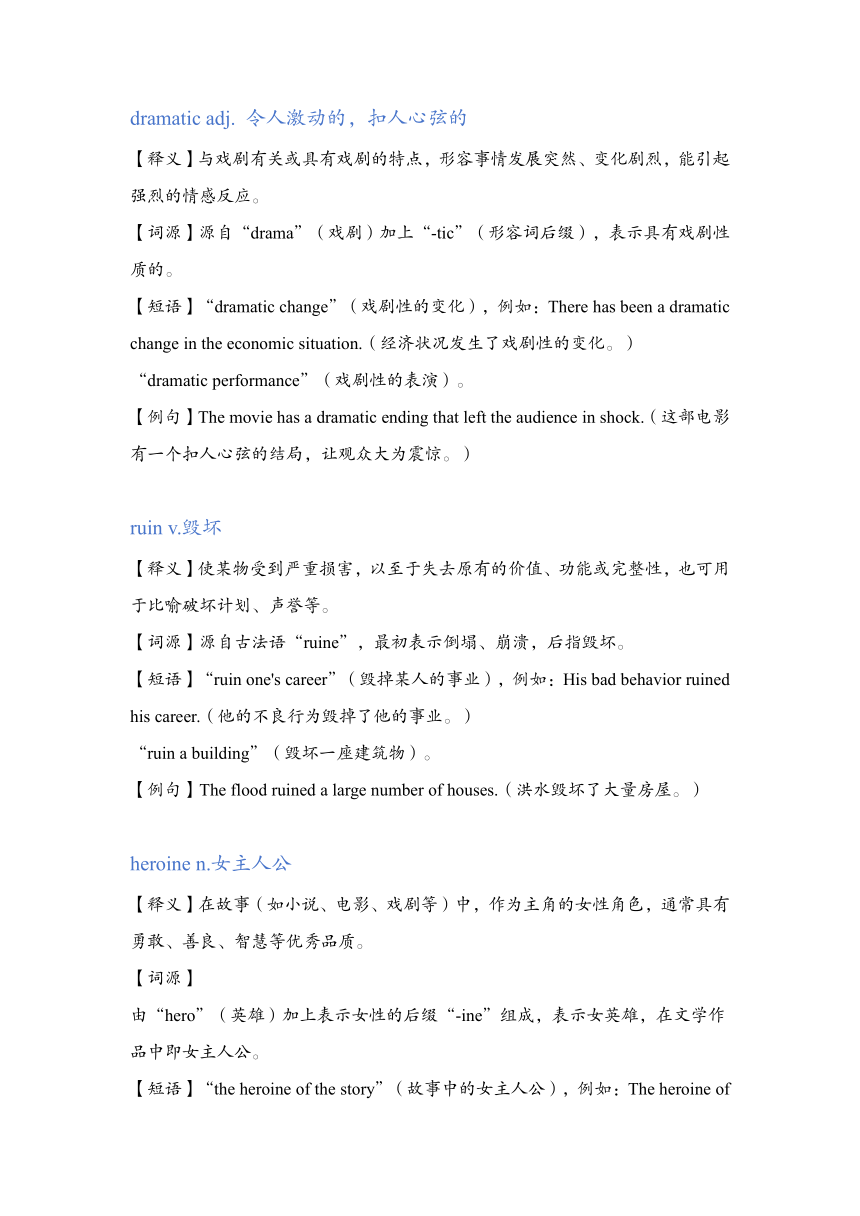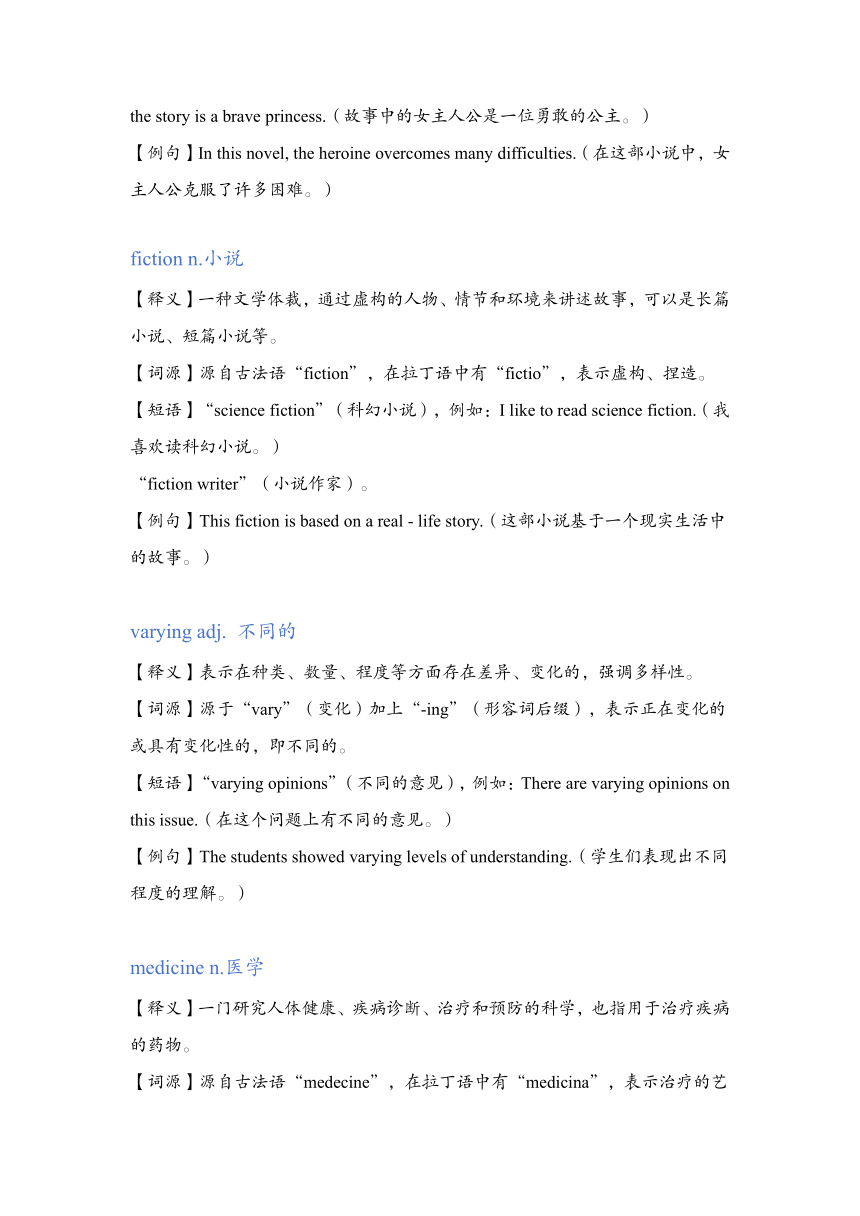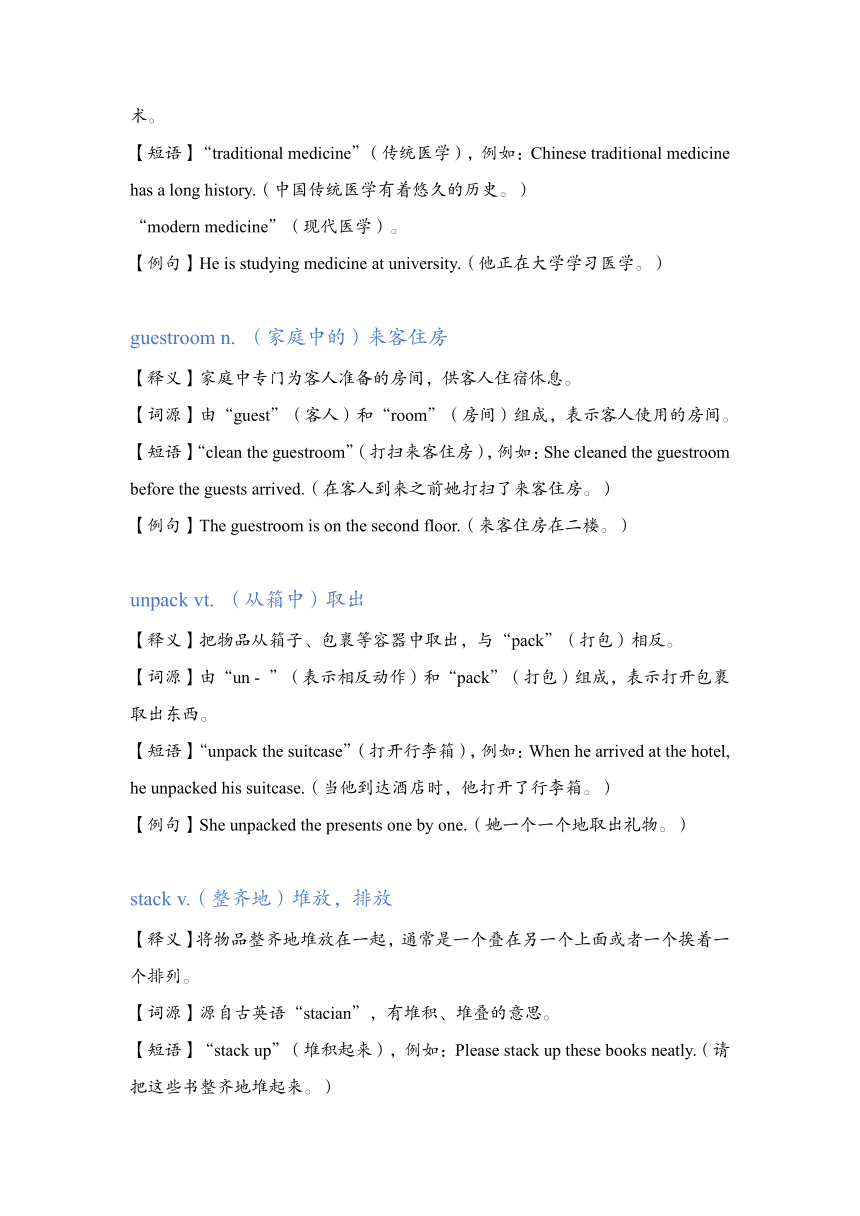新概念第三册Lesson 24 A skeleton in the cupboard讲义
文档属性
| 名称 | 新概念第三册Lesson 24 A skeleton in the cupboard讲义 |

|
|
| 格式 | docx | ||
| 文件大小 | 181.1KB | ||
| 资源类型 | 教案 | ||
| 版本资源 | 新概念英语 | ||
| 科目 | 英语 | ||
| 更新时间 | 2024-12-04 00:00:00 | ||
图片预览





文档简介
新概念第三册
Lesson 24 A skeleton in the cupboard
单词精讲
skeleton n.骷髅
【释义】指人或动物死后,肉体腐烂后剩下的骨头框架,也可用于比喻事物的框架、轮廓或基本结构。
【词源】源自古希腊语“skeletos”,有干枯的、干瘪的意思,最初用于描述尸体干枯后的骨头架子。
【短语】“skeleton in the closet”(不可告人的秘密),例如:Everyone has a skeleton in the closet.(每个人都有一些不可告人的秘密。)
“human skeleton”(人体骨骼)。
【例句】The archaeologists found a complete skeleton at the ancient burial site.(考古学家在古代墓葬遗址发现了一具完整的骷髅。)
seemingly adv. 表面上地
【释义】表示根据表面现象或从外观来看,不一定反映真实的内在情况。
【词源】由“seem”(看起来、似乎)加上“-ingly”(表示方式的后缀)组成,表示看起来的方式,即表面上地。
【短语】“seemingly easy”(表面上容易),例如:The task was seemingly easy but actually very difficult.(这项任务表面上容易但实际上非常困难。)
【例句】Seemingly, he was calm, but in fact he was very nervous.(表面上,他很平静,但实际上他非常紧张。)
respectable adj. 体面的,雅观的
【释义】形容人或事物具有符合社会规范、值得尊重的品质,外观或行为上显得正派、得体。
【词源】源自“respect”(尊重)加上“-able”(可……的)后缀,表示可被尊重的,即体面的。
【短语】“respectable family”(体面的家庭),例如:She comes from a respectable family.(她来自一个体面的家庭。)
“respectable appearance”(雅观的外表)。
【例句】He always wears a respectable suit to work.(他总是穿着得体的西装去上班。)
conceal v.隐藏,隐瞒
【释义】把某物或某事藏起来不让人看见、知道,故意掩盖真相或信息。
【词源】源自古法语“conceler”,在拉丁语中有“concelare”,表示完全隐藏起来。
【短语】“conceal from”(对……隐瞒),例如:He tried to conceal his mistake from his boss.(他试图向老板隐瞒他的错误。)
“conceal oneself”(隐藏自己)。
【例句】The thief concealed the stolen goods in a secret place.(小偷把偷来的东西藏在一个秘密的地方。)
vivid adj.生动的
【释义】形容事物具有鲜明、强烈的色彩、形象或细节,能给人以深刻的印象,好像栩栩如生。
【词源】源自拉丁语“vividus”,有充满生命力的、活泼的意思,后引申为生动的。
【短语】“vivid description”(生动的描述),例如:The author gave a vivid description of the scenery.(作者对风景作了生动的描述。)
“vivid memory”(清晰的记忆)。
【例句】Her vivid performance on stage attracted a lot of audiences.(她在舞台上生动的表演吸引了很多观众。)
dramatic adj. 令人激动的,扣人心弦的
【释义】与戏剧有关或具有戏剧的特点,形容事情发展突然、变化剧烈,能引起强烈的情感反应。
【词源】源自“drama”(戏剧)加上“-tic”(形容词后缀),表示具有戏剧性质的。
【短语】“dramatic change”(戏剧性的变化),例如:There has been a dramatic change in the economic situation.(经济状况发生了戏剧性的变化。)
“dramatic performance”(戏剧性的表演)。
【例句】The movie has a dramatic ending that left the audience in shock.(这部电影有一个扣人心弦的结局,让观众大为震惊。)
ruin v.毁坏
【释义】使某物受到严重损害,以至于失去原有的价值、功能或完整性,也可用于比喻破坏计划、声誉等。
【词源】源自古法语“ruine”,最初表示倒塌、崩溃,后指毁坏。
【短语】“ruin one's career”(毁掉某人的事业),例如:His bad behavior ruined his career.(他的不良行为毁掉了他的事业。)
“ruin a building”(毁坏一座建筑物)。
【例句】The flood ruined a large number of houses.(洪水毁坏了大量房屋。)
heroine n.女主人公
【释义】在故事(如小说、电影、戏剧等)中,作为主角的女性角色,通常具有勇敢、善良、智慧等优秀品质。
【词源】
由“hero”(英雄)加上表示女性的后缀“-ine”组成,表示女英雄,在文学作品中即女主人公。
【短语】“the heroine of the story”(故事中的女主人公),例如:The heroine of the story is a brave princess.(故事中的女主人公是一位勇敢的公主。)
【例句】In this novel, the heroine overcomes many difficulties.(在这部小说中,女主人公克服了许多困难。)
fiction n.小说
【释义】一种文学体裁,通过虚构的人物、情节和环境来讲述故事,可以是长篇小说、短篇小说等。
【词源】源自古法语“fiction”,在拉丁语中有“fictio”,表示虚构、捏造。
【短语】“science fiction”(科幻小说),例如:I like to read science fiction.(我喜欢读科幻小说。)
“fiction writer”(小说作家)。
【例句】This fiction is based on a real - life story.(这部小说基于一个现实生活中的故事。)
varying adj. 不同的
【释义】表示在种类、数量、程度等方面存在差异、变化的,强调多样性。
【词源】源于“vary”(变化)加上“-ing”(形容词后缀),表示正在变化的或具有变化性的,即不同的。
【短语】“varying opinions”(不同的意见),例如:There are varying opinions on this issue.(在这个问题上有不同的意见。)
【例句】The students showed varying levels of understanding.(学生们表现出不同程度的理解。)
medicine n.医学
【释义】一门研究人体健康、疾病诊断、治疗和预防的科学,也指用于治疗疾病的药物。
【词源】源自古法语“medecine”,在拉丁语中有“medicina”,表示治疗的艺术。
【短语】“traditional medicine”(传统医学),例如:Chinese traditional medicine has a long history.(中国传统医学有着悠久的历史。)
“modern medicine”(现代医学)。
【例句】He is studying medicine at university.(他正在大学学习医学。)
guestroom n. (家庭中的)来客住房
【释义】家庭中专门为客人准备的房间,供客人住宿休息。
【词源】由“guest”(客人)和“room”(房间)组成,表示客人使用的房间。
【短语】“clean the guestroom”(打扫来客住房),例如:She cleaned the guestroom before the guests arrived.(在客人到来之前她打扫了来客住房。)
【例句】The guestroom is on the second floor.(来客住房在二楼。)
unpack vt. (从箱中)取出
【释义】把物品从箱子、包裹等容器中取出,与“pack”(打包)相反。
【词源】由“un - ”(表示相反动作)和“pack”(打包)组成,表示打开包裹取出东西。
【短语】“unpack the suitcase”(打开行李箱),例如:When he arrived at the hotel, he unpacked his suitcase.(当他到达酒店时,他打开了行李箱。)
【例句】She unpacked the presents one by one.(她一个一个地取出礼物。)
stack v.(整齐地)堆放,排放
【释义】将物品整齐地堆放在一起,通常是一个叠在另一个上面或者一个挨着一个排列。
【词源】源自古英语“stacian”,有堆积、堆叠的意思。
【短语】“stack up”(堆积起来),例如:Please stack up these books neatly.(请把这些书整齐地堆起来。)
【例句】The workers stacked the boxes in the warehouse.(工人们在仓库里堆放箱子。)
underclothes n. 内衣
【释义】穿在里面贴近身体的衣物,包括内裤、胸罩等。
【词源】由“under”(在……下面)和“clothes”(衣服)组成,表示穿在其他衣服下面的衣服,即内衣。
【短语】“change one's underclothes”(更换内衣),例如:It is important to change your underclothes regularly.(定期更换内衣是很重要的。)
【例句】She bought some new underclothes at the department store.(她在百货商店买了一些新内衣。)
drawer n. 抽屉
【释义】家具(如桌子、柜子等)中可拉出或推进的部分,用于存放物品。
【词源】源自古英语“dragan”(拉),表示可以拉出来的部分,即抽屉。
【短语】“open the drawer”(打开抽屉),例如:He opened the drawer to find a pen.(他打开抽屉找一支笔。)
【例句】There are some papers in the drawer.(抽屉里有一些文件。)
petrify v.使惊呆
【释义】使某人因极度恐惧、惊讶等而无法动弹或做出反应,好像变成石头一样。
【词源】源自古希腊语“petra”(石头)和“-fy”(使……化)后缀,使变成石头,引申为使惊呆。
【短语】“be petrified with fear”(被吓呆),例如:The little girl was petrified with fear when she saw the snake.(小女孩看到蛇时被吓呆了。)
【例句】The sudden noise petrified him for a moment.(突然的噪音使他一时惊呆了。)
dangle v.悬挂
【释义】使某物在空中晃荡、悬垂,通常是一端固定,另一端自由摆动。
【词源】可能源自古斯堪的纳维亚语,有摇晃、摆动的意思。
【短语】“dangle from”(从……悬挂),例如:The keys dangled from his belt.(钥匙从他的腰带上悬挂着。)
【例句】A spider dangles a thread.(蜘蛛吐出一根丝悬垂着。)
sway v.摇摆
【释义】物体(如树枝、身体等)来回摆动、摇晃,也可表示在观点、情感等方面的动摇。
【词源】源自古英语“swāgan”,有弯曲、摆动的意思。
【短语】“sway back and forth”(前后摇摆),例如:The branches sway back and forth in the wind.(树枝在风中前后摇摆。)
【例句】His opinion swayed after hearing different arguments.(听了不同的论点后,他的观点动摇了。)
unsympathetic adj. 不表同情的,无动于衷的
【释义】形容人对他人的痛苦、困难等缺乏同情心,没有表现出同情或关心的态度。
【词源】由“un - ”(否定前缀)和“sympathetic”(同情的)组成,表示不同情的。
【短语】“unsympathetic attitude”(不表同情的态度),例如:His unsympathetic attitude made her feel disappointed.(他不表同情的态度让她感到失望。)
【例句】
The boss was unsympathetic to his employees' problems.(老板对员工的问题无动于衷。)
二、课文精讲
1.We often read in novels how a seemingly respectable person or family has some terrible secret which has been concealed from strangers for years.在小说中,我们经常读到一个表面上受人尊重的人物或家庭,却有着某种多年不为人所知的骇人听闻的秘密。
how引导宾语从句
which 引导的定语从句,修饰说明secret
seemingly: 9=from appearence )从表面上看来,
a seemingly respectable person:表面上受尊重的人
some—表示“某一个”,修饰单数可数名词
conceal sth, from sb. 作“对某人隐瞒某事”解。
2.The English language possesses a vivid saying to describe this sort of situation.语中有一个生动的说法来形容这种情况。
possess=have got, own )
不定式to作定语,修饰说明vivid saying, 来描述这种场景。
3.The terrible secret is called 'a skeleton in the cupboard'.惊人的秘密称作“柜中骷髅”。 A skeleton in the cupboard,直译为“柜中骷髅”,此系一成语,作“家丑”解。
frightened: 在某个特定的场合下,受到惊吓
terrified:表示惊吓的程度,更加强烈,感到恐怖
afraid (of ): 表示一种状态,永久性的恐惧
4.At some dramatic moment in the story, the terrible secret becomes known and a reputation is ruined.在小说的某个戏剧性时刻,可怕的秘密泄漏出来,接着便是某人的声誉扫地。
ruin 泛指概念,表示毁坏的过程不是一下完成的 (spoil )
The rain ruined / spoiled our holiday.
5.The reader's hair stands on end when he reads in the final pages of the novel that the heroine, a dear old lady who had always been so kind to everybody, had, in her youth, poisoned every one of her five husbands.当读者读到小说最后几页了解到书中女主人公,那位一向待大家很好的可爱的老妇人年轻时一连毒死了她的5个丈夫时,不禁会毛骨悚然。 The reader's hair stands on end,读者感到毛骨悚然。
one's hair stands on end :某人感到毛骨悚然的
I thought I was alone in my room until I heard the mysterious noice again, and my hair stands on end.
make/set one's hair stand on end: 使某人感到毛骨悚然的
in her youth:在她年轻时
every one of与介词of 连用时要分开
6.It is all very well for such things to occur in fiction.这种事发生在小说中是无可非议的。
it is all very well but 不赞成不满意的反语,“好倒是好,但是……”
Eg: It is all very well for them to ask me to do it, but I am too busy.
It is all very well for you to suggent taking a few days rest, but how can finish our work in time.
occur: 某个事件出乎意料的发生(正式)
happen: 某个事件出乎意料发生
take place: 事件根据安排“举行”
Eg.: When did the accident happen / occur
It occured to me that / to do.
It occured to me to open the window.
When will the wedding take place
7.To varying degrees, we all have secrets which we do not want even our closest friends to learn, but few of us have skeletons in the cupboard.尽管我们人人都有各种大小秘密。连最亲密的朋友都不愿让他们知道,但我们当中极少有人有柜中骷髅。
to varying degrees,在不同程度上。
which引导定语从句修饰secret
learn: 了解某个事实,学习某种知识、技能
know 知道某个事实,具有某方面的知识、技能,认识、了解某个人(状态动词,不能用于进行时态)
I learned that I had passed the test.
She knows about computers.
She is learning about computers.
8.George studied medicine in his youth. Instead of becoming a doctor, however, he became a successful writer of detective stories.乔治年轻时学过医,然而,他后来没当上医生,却成了一位成功的侦探小说作家。
instead of + doing----表示相反、没有、取而代之的是......
9.I opened the cupboard door and then stood in front of it petrified.我打开柜门,站在柜门前一下子惊呆了。
stood in front of it petrified,站在柜前吓呆了。 stood in front of sth. petrified: 站在…前,目瞪口呆 stand此处表示处于某种状态,起系动词的作用,后面常接形容词、介词短语或过去分词,表示主语处于某种状态中的特征,可视作表语。
10.The sudden movement of the door made it sway slightly and it gave me the impression that it was about to leap out at me.由于柜门突然打开,它也随之轻微摇晃起来,让我觉得它好像马上要跳出柜门朝我扑过来似的。 the impression that it was about to leap out…, that引导的从句作impression的同位语。be about to do sth. ,表示按照计划即将做的动作。 it gave me the impression that:给某人以印象
make a lasting impression on sb: 给某人以不可磨灭的印象
have a false impression of sb: 对某人有错误的看法
give sb impression that: 给某人印象
impress sb with sth 用…给某人留下印象
be about to do sth.: 即将,就要。暗示动作即将发生(多与when连用)
I was about to go to bed when there was a knock at the door.
leap out at sb. 跳出来扑向某人
11.Dropping my suit, I dashed downstairs to tell George.我扔下西服冲下楼去告诉乔治。
drop----是我所发出的主动动作,所以用-ing形式
12.But George was unsympathetic. 'Oh, that,' he said with a smile as if he were talking about an old friend.但乔治却无动于衷。“噢,是它呀!他笑着说道,俨然在谈论一位老朋友。
as if 引导虚拟语气
Lesson 24 A skeleton in the cupboard
单词精讲
skeleton n.骷髅
【释义】指人或动物死后,肉体腐烂后剩下的骨头框架,也可用于比喻事物的框架、轮廓或基本结构。
【词源】源自古希腊语“skeletos”,有干枯的、干瘪的意思,最初用于描述尸体干枯后的骨头架子。
【短语】“skeleton in the closet”(不可告人的秘密),例如:Everyone has a skeleton in the closet.(每个人都有一些不可告人的秘密。)
“human skeleton”(人体骨骼)。
【例句】The archaeologists found a complete skeleton at the ancient burial site.(考古学家在古代墓葬遗址发现了一具完整的骷髅。)
seemingly adv. 表面上地
【释义】表示根据表面现象或从外观来看,不一定反映真实的内在情况。
【词源】由“seem”(看起来、似乎)加上“-ingly”(表示方式的后缀)组成,表示看起来的方式,即表面上地。
【短语】“seemingly easy”(表面上容易),例如:The task was seemingly easy but actually very difficult.(这项任务表面上容易但实际上非常困难。)
【例句】Seemingly, he was calm, but in fact he was very nervous.(表面上,他很平静,但实际上他非常紧张。)
respectable adj. 体面的,雅观的
【释义】形容人或事物具有符合社会规范、值得尊重的品质,外观或行为上显得正派、得体。
【词源】源自“respect”(尊重)加上“-able”(可……的)后缀,表示可被尊重的,即体面的。
【短语】“respectable family”(体面的家庭),例如:She comes from a respectable family.(她来自一个体面的家庭。)
“respectable appearance”(雅观的外表)。
【例句】He always wears a respectable suit to work.(他总是穿着得体的西装去上班。)
conceal v.隐藏,隐瞒
【释义】把某物或某事藏起来不让人看见、知道,故意掩盖真相或信息。
【词源】源自古法语“conceler”,在拉丁语中有“concelare”,表示完全隐藏起来。
【短语】“conceal from”(对……隐瞒),例如:He tried to conceal his mistake from his boss.(他试图向老板隐瞒他的错误。)
“conceal oneself”(隐藏自己)。
【例句】The thief concealed the stolen goods in a secret place.(小偷把偷来的东西藏在一个秘密的地方。)
vivid adj.生动的
【释义】形容事物具有鲜明、强烈的色彩、形象或细节,能给人以深刻的印象,好像栩栩如生。
【词源】源自拉丁语“vividus”,有充满生命力的、活泼的意思,后引申为生动的。
【短语】“vivid description”(生动的描述),例如:The author gave a vivid description of the scenery.(作者对风景作了生动的描述。)
“vivid memory”(清晰的记忆)。
【例句】Her vivid performance on stage attracted a lot of audiences.(她在舞台上生动的表演吸引了很多观众。)
dramatic adj. 令人激动的,扣人心弦的
【释义】与戏剧有关或具有戏剧的特点,形容事情发展突然、变化剧烈,能引起强烈的情感反应。
【词源】源自“drama”(戏剧)加上“-tic”(形容词后缀),表示具有戏剧性质的。
【短语】“dramatic change”(戏剧性的变化),例如:There has been a dramatic change in the economic situation.(经济状况发生了戏剧性的变化。)
“dramatic performance”(戏剧性的表演)。
【例句】The movie has a dramatic ending that left the audience in shock.(这部电影有一个扣人心弦的结局,让观众大为震惊。)
ruin v.毁坏
【释义】使某物受到严重损害,以至于失去原有的价值、功能或完整性,也可用于比喻破坏计划、声誉等。
【词源】源自古法语“ruine”,最初表示倒塌、崩溃,后指毁坏。
【短语】“ruin one's career”(毁掉某人的事业),例如:His bad behavior ruined his career.(他的不良行为毁掉了他的事业。)
“ruin a building”(毁坏一座建筑物)。
【例句】The flood ruined a large number of houses.(洪水毁坏了大量房屋。)
heroine n.女主人公
【释义】在故事(如小说、电影、戏剧等)中,作为主角的女性角色,通常具有勇敢、善良、智慧等优秀品质。
【词源】
由“hero”(英雄)加上表示女性的后缀“-ine”组成,表示女英雄,在文学作品中即女主人公。
【短语】“the heroine of the story”(故事中的女主人公),例如:The heroine of the story is a brave princess.(故事中的女主人公是一位勇敢的公主。)
【例句】In this novel, the heroine overcomes many difficulties.(在这部小说中,女主人公克服了许多困难。)
fiction n.小说
【释义】一种文学体裁,通过虚构的人物、情节和环境来讲述故事,可以是长篇小说、短篇小说等。
【词源】源自古法语“fiction”,在拉丁语中有“fictio”,表示虚构、捏造。
【短语】“science fiction”(科幻小说),例如:I like to read science fiction.(我喜欢读科幻小说。)
“fiction writer”(小说作家)。
【例句】This fiction is based on a real - life story.(这部小说基于一个现实生活中的故事。)
varying adj. 不同的
【释义】表示在种类、数量、程度等方面存在差异、变化的,强调多样性。
【词源】源于“vary”(变化)加上“-ing”(形容词后缀),表示正在变化的或具有变化性的,即不同的。
【短语】“varying opinions”(不同的意见),例如:There are varying opinions on this issue.(在这个问题上有不同的意见。)
【例句】The students showed varying levels of understanding.(学生们表现出不同程度的理解。)
medicine n.医学
【释义】一门研究人体健康、疾病诊断、治疗和预防的科学,也指用于治疗疾病的药物。
【词源】源自古法语“medecine”,在拉丁语中有“medicina”,表示治疗的艺术。
【短语】“traditional medicine”(传统医学),例如:Chinese traditional medicine has a long history.(中国传统医学有着悠久的历史。)
“modern medicine”(现代医学)。
【例句】He is studying medicine at university.(他正在大学学习医学。)
guestroom n. (家庭中的)来客住房
【释义】家庭中专门为客人准备的房间,供客人住宿休息。
【词源】由“guest”(客人)和“room”(房间)组成,表示客人使用的房间。
【短语】“clean the guestroom”(打扫来客住房),例如:She cleaned the guestroom before the guests arrived.(在客人到来之前她打扫了来客住房。)
【例句】The guestroom is on the second floor.(来客住房在二楼。)
unpack vt. (从箱中)取出
【释义】把物品从箱子、包裹等容器中取出,与“pack”(打包)相反。
【词源】由“un - ”(表示相反动作)和“pack”(打包)组成,表示打开包裹取出东西。
【短语】“unpack the suitcase”(打开行李箱),例如:When he arrived at the hotel, he unpacked his suitcase.(当他到达酒店时,他打开了行李箱。)
【例句】She unpacked the presents one by one.(她一个一个地取出礼物。)
stack v.(整齐地)堆放,排放
【释义】将物品整齐地堆放在一起,通常是一个叠在另一个上面或者一个挨着一个排列。
【词源】源自古英语“stacian”,有堆积、堆叠的意思。
【短语】“stack up”(堆积起来),例如:Please stack up these books neatly.(请把这些书整齐地堆起来。)
【例句】The workers stacked the boxes in the warehouse.(工人们在仓库里堆放箱子。)
underclothes n. 内衣
【释义】穿在里面贴近身体的衣物,包括内裤、胸罩等。
【词源】由“under”(在……下面)和“clothes”(衣服)组成,表示穿在其他衣服下面的衣服,即内衣。
【短语】“change one's underclothes”(更换内衣),例如:It is important to change your underclothes regularly.(定期更换内衣是很重要的。)
【例句】She bought some new underclothes at the department store.(她在百货商店买了一些新内衣。)
drawer n. 抽屉
【释义】家具(如桌子、柜子等)中可拉出或推进的部分,用于存放物品。
【词源】源自古英语“dragan”(拉),表示可以拉出来的部分,即抽屉。
【短语】“open the drawer”(打开抽屉),例如:He opened the drawer to find a pen.(他打开抽屉找一支笔。)
【例句】There are some papers in the drawer.(抽屉里有一些文件。)
petrify v.使惊呆
【释义】使某人因极度恐惧、惊讶等而无法动弹或做出反应,好像变成石头一样。
【词源】源自古希腊语“petra”(石头)和“-fy”(使……化)后缀,使变成石头,引申为使惊呆。
【短语】“be petrified with fear”(被吓呆),例如:The little girl was petrified with fear when she saw the snake.(小女孩看到蛇时被吓呆了。)
【例句】The sudden noise petrified him for a moment.(突然的噪音使他一时惊呆了。)
dangle v.悬挂
【释义】使某物在空中晃荡、悬垂,通常是一端固定,另一端自由摆动。
【词源】可能源自古斯堪的纳维亚语,有摇晃、摆动的意思。
【短语】“dangle from”(从……悬挂),例如:The keys dangled from his belt.(钥匙从他的腰带上悬挂着。)
【例句】A spider dangles a thread.(蜘蛛吐出一根丝悬垂着。)
sway v.摇摆
【释义】物体(如树枝、身体等)来回摆动、摇晃,也可表示在观点、情感等方面的动摇。
【词源】源自古英语“swāgan”,有弯曲、摆动的意思。
【短语】“sway back and forth”(前后摇摆),例如:The branches sway back and forth in the wind.(树枝在风中前后摇摆。)
【例句】His opinion swayed after hearing different arguments.(听了不同的论点后,他的观点动摇了。)
unsympathetic adj. 不表同情的,无动于衷的
【释义】形容人对他人的痛苦、困难等缺乏同情心,没有表现出同情或关心的态度。
【词源】由“un - ”(否定前缀)和“sympathetic”(同情的)组成,表示不同情的。
【短语】“unsympathetic attitude”(不表同情的态度),例如:His unsympathetic attitude made her feel disappointed.(他不表同情的态度让她感到失望。)
【例句】
The boss was unsympathetic to his employees' problems.(老板对员工的问题无动于衷。)
二、课文精讲
1.We often read in novels how a seemingly respectable person or family has some terrible secret which has been concealed from strangers for years.在小说中,我们经常读到一个表面上受人尊重的人物或家庭,却有着某种多年不为人所知的骇人听闻的秘密。
how引导宾语从句
which 引导的定语从句,修饰说明secret
seemingly: 9=from appearence )从表面上看来,
a seemingly respectable person:表面上受尊重的人
some—表示“某一个”,修饰单数可数名词
conceal sth, from sb. 作“对某人隐瞒某事”解。
2.The English language possesses a vivid saying to describe this sort of situation.语中有一个生动的说法来形容这种情况。
possess=have got, own )
不定式to作定语,修饰说明vivid saying, 来描述这种场景。
3.The terrible secret is called 'a skeleton in the cupboard'.惊人的秘密称作“柜中骷髅”。 A skeleton in the cupboard,直译为“柜中骷髅”,此系一成语,作“家丑”解。
frightened: 在某个特定的场合下,受到惊吓
terrified:表示惊吓的程度,更加强烈,感到恐怖
afraid (of ): 表示一种状态,永久性的恐惧
4.At some dramatic moment in the story, the terrible secret becomes known and a reputation is ruined.在小说的某个戏剧性时刻,可怕的秘密泄漏出来,接着便是某人的声誉扫地。
ruin 泛指概念,表示毁坏的过程不是一下完成的 (spoil )
The rain ruined / spoiled our holiday.
5.The reader's hair stands on end when he reads in the final pages of the novel that the heroine, a dear old lady who had always been so kind to everybody, had, in her youth, poisoned every one of her five husbands.当读者读到小说最后几页了解到书中女主人公,那位一向待大家很好的可爱的老妇人年轻时一连毒死了她的5个丈夫时,不禁会毛骨悚然。 The reader's hair stands on end,读者感到毛骨悚然。
one's hair stands on end :某人感到毛骨悚然的
I thought I was alone in my room until I heard the mysterious noice again, and my hair stands on end.
make/set one's hair stand on end: 使某人感到毛骨悚然的
in her youth:在她年轻时
every one of与介词of 连用时要分开
6.It is all very well for such things to occur in fiction.这种事发生在小说中是无可非议的。
it is all very well but 不赞成不满意的反语,“好倒是好,但是……”
Eg: It is all very well for them to ask me to do it, but I am too busy.
It is all very well for you to suggent taking a few days rest, but how can finish our work in time.
occur: 某个事件出乎意料的发生(正式)
happen: 某个事件出乎意料发生
take place: 事件根据安排“举行”
Eg.: When did the accident happen / occur
It occured to me that / to do.
It occured to me to open the window.
When will the wedding take place
7.To varying degrees, we all have secrets which we do not want even our closest friends to learn, but few of us have skeletons in the cupboard.尽管我们人人都有各种大小秘密。连最亲密的朋友都不愿让他们知道,但我们当中极少有人有柜中骷髅。
to varying degrees,在不同程度上。
which引导定语从句修饰secret
learn: 了解某个事实,学习某种知识、技能
know 知道某个事实,具有某方面的知识、技能,认识、了解某个人(状态动词,不能用于进行时态)
I learned that I had passed the test.
She knows about computers.
She is learning about computers.
8.George studied medicine in his youth. Instead of becoming a doctor, however, he became a successful writer of detective stories.乔治年轻时学过医,然而,他后来没当上医生,却成了一位成功的侦探小说作家。
instead of + doing----表示相反、没有、取而代之的是......
9.I opened the cupboard door and then stood in front of it petrified.我打开柜门,站在柜门前一下子惊呆了。
stood in front of it petrified,站在柜前吓呆了。 stood in front of sth. petrified: 站在…前,目瞪口呆 stand此处表示处于某种状态,起系动词的作用,后面常接形容词、介词短语或过去分词,表示主语处于某种状态中的特征,可视作表语。
10.The sudden movement of the door made it sway slightly and it gave me the impression that it was about to leap out at me.由于柜门突然打开,它也随之轻微摇晃起来,让我觉得它好像马上要跳出柜门朝我扑过来似的。 the impression that it was about to leap out…, that引导的从句作impression的同位语。be about to do sth. ,表示按照计划即将做的动作。 it gave me the impression that:给某人以印象
make a lasting impression on sb: 给某人以不可磨灭的印象
have a false impression of sb: 对某人有错误的看法
give sb impression that: 给某人印象
impress sb with sth 用…给某人留下印象
be about to do sth.: 即将,就要。暗示动作即将发生(多与when连用)
I was about to go to bed when there was a knock at the door.
leap out at sb. 跳出来扑向某人
11.Dropping my suit, I dashed downstairs to tell George.我扔下西服冲下楼去告诉乔治。
drop----是我所发出的主动动作,所以用-ing形式
12.But George was unsympathetic. 'Oh, that,' he said with a smile as if he were talking about an old friend.但乔治却无动于衷。“噢,是它呀!他笑着说道,俨然在谈论一位老朋友。
as if 引导虚拟语气
同课章节目录
